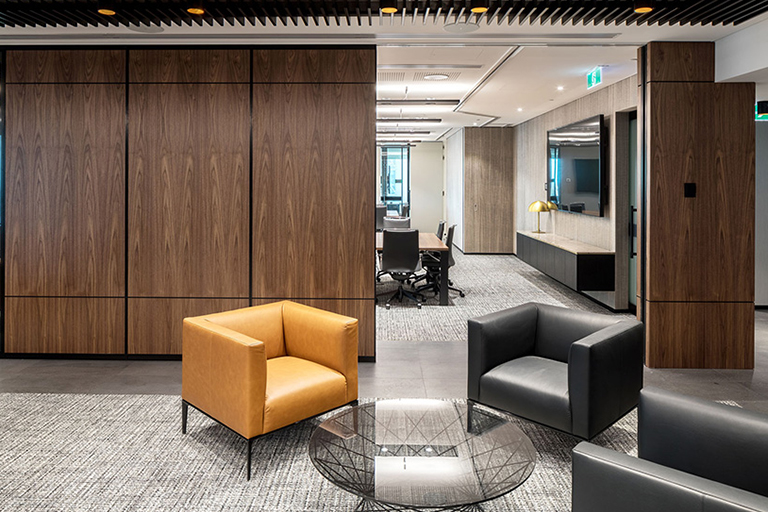
A family-owned business with 160 staff, and annual turnover of $45 million, Lotus Doors is a highly innovative player in the world of adaptive space solutions.
In this episode Liz Jones, CEO of Lotus, shares the journey from becoming the company’s new CEO and diagnosing organisational problems to driving the company’s continual growth and reputation for quality. The company has changed a lot since its inception. Fostering a productive workplace culture has been a big part of driving this change.
Listen and subscribe
About Lotus Doors
In the company’s infancy, Lotus made sliding shower screens and folding doors. Today, Lotus employs sophisticated engineers and designers to manufacture adaptive spaces for offices, education facilities, restaurants and stadiums and high-end residential complexes too. Part of their niche offering is acoustics to go with flexible spaces.
It’s a niche industry, and there’s a lot of science around how to minimise sound, absorbing sound, and the impact of sound on people and their wellbeing. Lotus employs a lot of engineers, not only due to the technical nature of what they do, but the engineering mind works really well given the nuances of creating effective acoustic solutions. As a leader in the company, Liz recognised that the business is a good fit for technically minded people who love technical selling, detailing and architecture.
Leadership change and maintaining growth
Liz became CEO of Lotus in 2018. The decision was driven by a board who realised leadership and organisational change was needed, and fast. The markets were growing, their product categories were growing, and Lotus was becoming a brand leader in the sector. Despite the successful growth of the company, challenges arose when it came to keeping up in a responsible, sustainable way. These challenges were primarily focused around the people and culture challenges across the company.
Diagnosing problems and strategising change
When Liz became CEO, the company was experiencing problems with high staff turnover and low engagement. To diagnose and understand organisational problems, she spent time immersing herself in the business. This time included a review of historical financials, one-on-one meetings with people across the business and customer visits to identify what the company needed to do to realise sustainable, long-term growth. It was going to require big changes in business systems and processes, along with a rethink around improving the company’s culture.
Bringing people on the journey
With organisational change of any type, it’s critical that you bring people on the journey to keep them engaged and enthusiastic about the company’s mission and vision. Liz’s first step in getting buy-in for strategising the road ahead for the business was getting the company’s leadership on board. Throughout this stage, and all stages of the change, cultural values became paramount. Liz recalls that people were fearful of speaking up in the beginning and didn’t want to transfer knowledge thinking it might give them more power. A key part of changing this culture was building a courageous culture where people spoke up and shared their honest views. It became about allowing people the opportunity to speak up and be heard and emphasising the importance of courage, resilience, and perseverance.
Engage across the business regularly
As a business leader, Liz understands the importance of engaging across the business, formally and informally. To stay connected with all parts of the business, Liz organises regular touchpoints, some of which include:
- weekly factory walk throughs to review visual boards and metrics and speak to team leaders
- informal walks around the factory floor
- ‘CEO Connect’ – a facilitated bi-monthly workshop
- new starter catch ups
- coffee catch ups with people who have been in the business for a year.
Each of these connection points, along with Liz’s work on business systems and processes brings a proactive approach to managing challenges and opportunities. She acknowledged in the episode that sometimes tough decisions need to be made and, as a leader, you need to own them.
When growth outstrips customer service
Another key challenge the business had to overcome was its fast pace of growth. While fast growth can be seen as a good thing from a commercial perspective, sometimes there are other areas of the business that suffer. At Lotus, customer service levels declined for a while as growth picked up. To gauge customer satisfaction, the business sought its first net promoter score (NPS) in 2019. This exercise involved interviewing a sample of customers, followed by the leadership team analysing detractors and promoters and looking at how Lotus Doors’ service stacks up against its competitors. Liz noted that the surprises from exercises such as these provide valuable insights for business improvement.
It takes risk to grow a business
Liz sums up risk perfectly, “You don’t learn if you don’t take risks. Obviously a more commercially impactful risk requires more consideration…”. Noting the importance of taking risks for business growth, Liz outlined that if you want to build a business that transforms and transcends the status quo, you have to take risks. Keeping perspective as you do this – weighing up the impacts if risks do or do not payoff – is key.
Entering business awards is an opportunity for reflection
Another big part of Liz’s recent career journey is nominating for and winning the 2019 Telstra Business Woman of the Year Award (Victorian State Award). Not only was it a big application process, but it provided Liz with an opportunity to meet inspiring businesswomen and reflect on Lotus Doors’ progress in recent years. Outside of nominating for and winning a Victorian business award, it shows how impactful this reflection time can be for business owners and leaders.
Sometimes a business doesn’t change in the big moments
When asked about the pivotal moments that have driven the business forward, Liz noted that sometimes it’s not just the big moments that are transformative. The little moments where you feel like the business is moving in the right direction are just as impactful too. These little moments come from small interactions with employees where they share good feedback about where the business is going, pride in watching people’s journeys through change and strong customer orders.
Lotus journey has been exciting. Continually building great organisational capabilities that will have a strong impact on offering quality to the market, along with creating an environment where the business’s people can thrive has been critical for Liz and the company’s leadership. She thinks Lotus will look very different in five years as the team continues to build on the progress they’ve made in recent years.
Feature image from Lotus Doors
Return to Radar for Growth and access our other client stories here.





